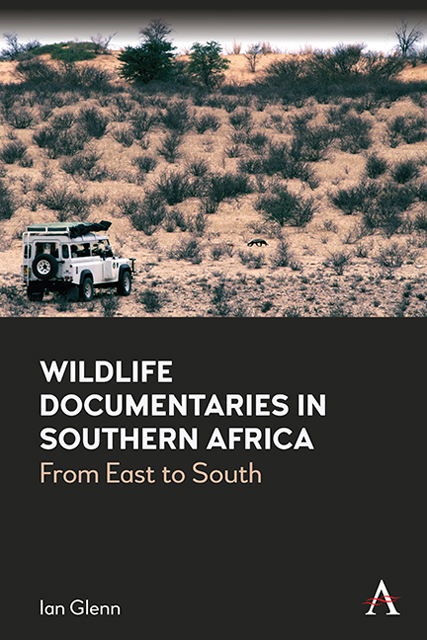Book contents
- Frontmatter
- Dedication
- Contents
- List of Figures
- Acknowledgements
- Introduction
- Chapter 1 What do the Critics Say?
- Chapter 2 A Theoretical Coalition?
- Chapter 3 Gone South: From East to Southern Africa
- Chapter 4 Private Lodges, Infrastructures and Guides
- Chapter 5 Going South: The Results
- Chapter 6 The Early History
- Chapter 7 The South Africans Enter the Game
- Chapter 8 Michael Rosenberg and Partridge Films
- Chapter 9 David and Carol Hughes
- Chapter 10 The Bartletts in the Namib, the Liversedges in Botswana
- Chapter 11 John Varty, Elmon Mhlongo and Londolozi
- Chapter 12 Richard Goss and Kim Wolhuter
- Chapter 13 Dereck and Beverly Joubert
- Chapter 14 Other Major Contributors
- Chapter 15 Going Live: Africam And Wildearth
- Chapter 16 Craig and Damon Foster
- Chapter 17 Must Love Animals?
- Chapter 18 The Social Turn
- Chapter 19 The Future of the Genre
- Chapter 20 The Influence of the Genre
- Conclusion
- Filmography
- Plates
- References
- Index
Chapter 13 - Dereck and Beverly Joubert
Published online by Cambridge University Press: 10 January 2023
- Frontmatter
- Dedication
- Contents
- List of Figures
- Acknowledgements
- Introduction
- Chapter 1 What do the Critics Say?
- Chapter 2 A Theoretical Coalition?
- Chapter 3 Gone South: From East to Southern Africa
- Chapter 4 Private Lodges, Infrastructures and Guides
- Chapter 5 Going South: The Results
- Chapter 6 The Early History
- Chapter 7 The South Africans Enter the Game
- Chapter 8 Michael Rosenberg and Partridge Films
- Chapter 9 David and Carol Hughes
- Chapter 10 The Bartletts in the Namib, the Liversedges in Botswana
- Chapter 11 John Varty, Elmon Mhlongo and Londolozi
- Chapter 12 Richard Goss and Kim Wolhuter
- Chapter 13 Dereck and Beverly Joubert
- Chapter 14 Other Major Contributors
- Chapter 15 Going Live: Africam And Wildearth
- Chapter 16 Craig and Damon Foster
- Chapter 17 Must Love Animals?
- Chapter 18 The Social Turn
- Chapter 19 The Future of the Genre
- Chapter 20 The Influence of the Genre
- Conclusion
- Filmography
- Plates
- References
- Index
Summary
Introduction
Dereck and Beverly Joubert are undoubtedly the major exponents of the wildlife documentary genre in Southern Africa over the past half-century. They have made more films and won more awards for wildlife films than any other Southern African filmmakers (and probably more than any other wildlife filmmakers) including the Grand Teton award at the Jackson Hole film festival for Eternal Enemies (1992). More people have probably seen their films than any other African cultural product – one dissertation estimated that a billion people had seen Eternal Enemies, perhaps because it was released in 1992 before the fragmentation of channels and markets made it more and more difficult for any one film to dominate the genre. The Jouberts’ own website more modestly claims a quarter of a billion viewers for that film.
Their films have been the most innovative and ambitious wildlife documentaries in the region. The Jouberts have been Explorers in Residence for National Geographic, recognized by the Botswanan government for their contribution to conservation in that country, the force behind the Great Plains Conservation Initiative and published numerous books and scientific articles. Their careers both underline the importance of the enabling factors explored in Chapter 2, but also illustrate what kinds of achievement those factors made possible.
Background
Dereck Joubert was a South African who started guiding at Mala Mala. He met his wife Beverly at high school and their marriage has been one of the great partnerships of wildlife film (Walters 2013). He then entered into a partnership with Rodney Fuhr, an entrepreneur interested in lion conservation and filming lions who founded the Chobe Lion Research Institute. Fuhr and Joubert established a location in the Okavango as they felt this would be the best place for filming lions and this location has been central to most of the Jouberts’ subsequent work (Figure 13.1). In an interview, Joubert says that while working there as a zoologist, he ‘found a film camera in a research cabinet, read the manual and started to learn to shoot documentaries’ (Walters 2013). Joubert then went to London where, as Chapter 8 showed, he attended the London Film School briefly and came under the influence of Michael Rosenberg and also met David Hughes.
- Type
- Chapter
- Information
- Wildlife Documentaries in Southern AfricaFrom East to South, pp. 169 - 186Publisher: Anthem PressPrint publication year: 2022

